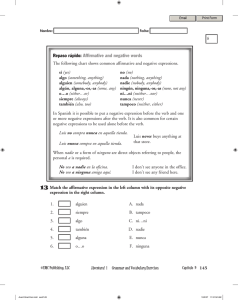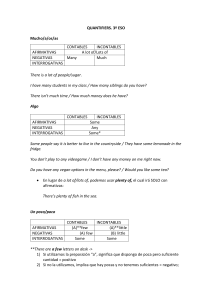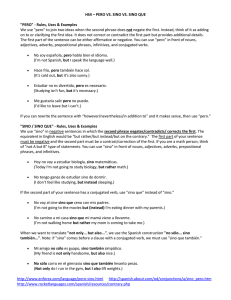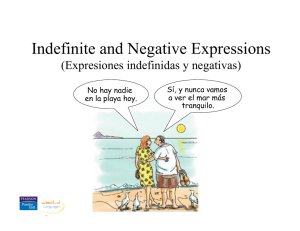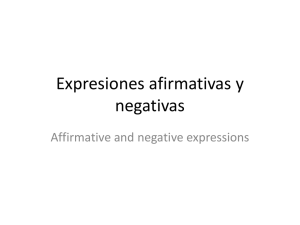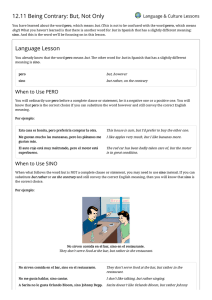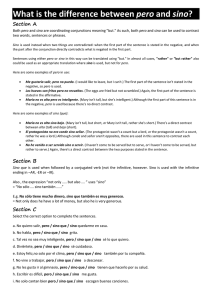4. siempre– always 4. nuncao jamás– never 5. alguna vez– ever 6
Anuncio
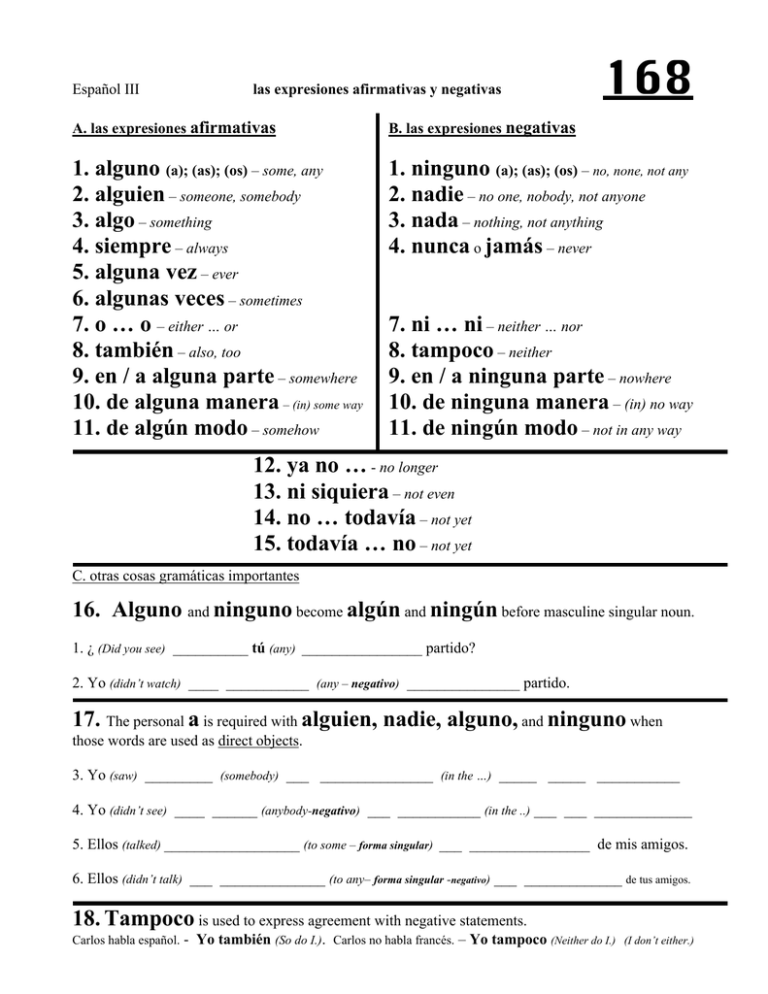
Español III las expresiones afirmativas y negativas 168 A. las expresiones afirmativas B. las expresiones negativas 1. alguno (a); (as); (os) – some, any 2. alguien – someone, somebody 3. algo – something 4. siempre – always 5. alguna vez – ever 6. algunas veces – sometimes 7. o … o – either … or 8. también – also, too 9. en / a alguna parte – somewhere 10. de alguna manera – (in) some way 11. de algún modo – somehow 1. ninguno (a); (as); (os) – no, none, not any 2. nadie – no one, nobody, not anyone 3. nada – nothing, not anything 4. nunca o jamás – never 7. ni … ni – neither … nor 8. tampoco – neither 9. en / a ninguna parte – nowhere 10. de ninguna manera – (in) no way 11. de ningún modo – not in any way 12. ya no … - no longer 13. ni siquiera – not even 14. no … todavía – not yet 15. todavía … no – not yet C. otras cosas gramáticas importantes 16. Alguno and ninguno become algún and ningún before masculine singular noun. 1. ¿ (Did you see) __________ tú (any) ________________ partido? 2. Yo (didn’t watch) ____ ___________ (any – negativo) _______________ partido. 17. The personal a is required with alguien, nadie, alguno, and ninguno when those words are used as direct objects. 3. Yo (saw) _________ (somebody) ___ _______________ (in the …) _____ _____ ___________ 4. Yo (didn’t see) ____ ______ (anybody-negativo) ___ ___________ (in the ..) ___ ___ _____________ 5. Ellos (talked) __________________ (to some – forma singular) ___ ________________ de mis amigos. 6. Ellos (didn’t talk) ___ ______________ (to any– forma singular -negativo) ___ _____________ de tus amigos. 18. Tampoco is used to express agreement with negative statements. Carlos habla español. - Yo también (So do I.). Carlos no habla francés. – Yo tampoco (Neither do I.) (I don’t either.) (168 de atrás) 19. negative word + verb or no + verb + negative word 7. (Nobody) ___________ (saw) _________ (the movie) _____ __________________. 8. Yo (didn’t see) ____ _______ (anybody-negativo) ___ __________ (in the ..) ___ ___ ____________ 9. Yo (never work) ___________ ______________ (on …) _______ __________________________. or Yo ______ _____________________ ____________ (on …) ______ ______________________. 10. *no necesitas ‘no’: (Nobody has) __________ ___________ (anything-negativo) ____________. 11. ¡Tú, (don’t say) ____ _____________ (anything-negativo) _________ (to anyone-neg.) __ __________! 20. Both pero and sino mean but. Sino is used if the first part of the sentence is negative and is contradicted by the second part. It is equivalent to the expressions but instead and but rather. 12. Nosotros (didn’t go) ____ ______________ a la playa (but instead) _________ a la piscina. 13. Yo (didn’t want to study) _____ __________ ___________ (but rather to rest) ______ ____________. 21. Pero is used instead of sino if there is no direct contradiction between the two parts of the sentence. 14. Mi primo (isn’t Spanish) _____ _____ ____________ (but lives in) _______ ________ ____ España. 15. Mi amigo (isn’t from) _____ _____ ____ State College (but he visits) ________ _________ mucho. 22. Sino que is used instead of sino to connect two contradictory clauses. 16. Nosotros (didn’t go) _____ ________________ al cine (but instead) _________ ________ (we stayed) _______ _______________________ en casa. 17. Oscar (didn’t get up) _____ ______ _________________ (but instead) ________ _________ (he slept) ____________________. D. Completa con el vocabulario nuevo. 18. Yo (didn’t go anywhere-negativo) _____ ________ ____ __________________ ___________. 19. (Somehow) ____ _________ __________, yo (arrived on time) ______________ ___ __________. 20. (Not any) ___________________ personas (arrived late) ________________________ __________. 21. ¡Tú, (do something) _________ __________! ¡Tú, (don’t do anything) ____ ___________ _______! 22. (Nobody answered.) ___________ ________________. o _____ _______________ __________ 23. Yo (read) _________ (some book) _________ ___________. Ella (didn’t read) ____ __________ (any book) ____________ ____________.
